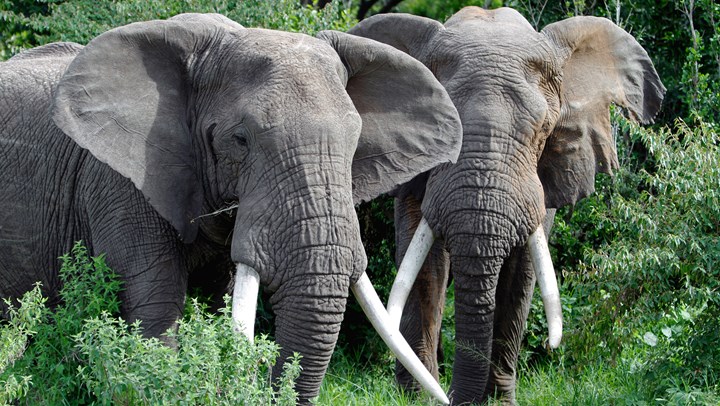
by James A. Swan, Ph.D. - Wednesday, August 31, 2016

Monday, Aug. 29, was a banner day for hunters as a Federal judge overturned New Jersey's recent law banning the import, possession and transport of legally-harvested African hunting trophies. Here is the scoop leading up to the big day in court as striking down the illegal law sets a precedent in the name of wildlife conservation.
On Thursday, June 2, New Jersey Governor Chris Christie signed bill S977 into law, prohibiting parts and products in the state that come from the hunting of African big-game animals and other species threatened with extinction. The governor also signed a second law, S978, enacting the same ban at airports and ports operated by the Port Authority of New York and New Jersey. The animals in the ban included elephants, leopards, lions, tigers, rhinos, cheetahs, pangolins, marine turtles and rays.
"Trophy hunting is a barbaric practice that defies standards of the humane treatment of animals," declared state Sen. Raymond Lesniak (D-Union), the main sponsor of the legislation. The bill was lauded by anti-hunting group Friends of Animals (FOA) and officially made New Jersey the second state after Washington to enact an import ban on legally-harvested hunting trophies.
While Christie vetoed the first version of the bill pending requested revisions, he reluctantly signed it earlier this summer after the revisions were made. Conservation Force, the Garden State Taxidermist Association, a New Jersey taxidermist and five New Jersey-based hunters sued the state to compel an end to New Jersey's ban on the import, possession, export, transport and processing of African hunting trophies. John Jackson III, president of Conservation Force, explained the state's ban was preempted by the Endangered Species Act (ESA), specifically ESA Section 6(f), which states: "Any State law or regulation which applies with respect to the importation or exportation of, or interstate or foreign commerce in, endangered species or threatened species is void to the extent that it may effectively...(2) prohibit what is authorized pursuant to an exemption or permit provided for in this Act or in any regulation which implements this Act."
On Monday, Judge Freda Wolfson of the U.S. Federal court in Trenton entered an order and judgment against the State of New Jersey prohibiting the enforcement of the ban against activities authorized by federal law, regulation or permit. Hunters may continue to import, export and possess federally authorized Big Four hunting trophies in the state.
Jackson, who said Judge Wolfson’s decision sets an important precedent, adds, "No state can prohibit the conduct of the ESA and the U.S. Fish and Wildlife Service permit. The New Jersey law was simply illegal—a matter of law as well as conservation. The Endangered Species Act supersedes this." Just as important, he explained, "Hunting for the Big Four and other African species supports the survival of all wildlife species by supporting local villages, and helping to fund efforts to curb poaching—the biggest problem associated with the conservation of African wildlife.” Fortunately, the case was settled quickly before other states followed this illegal example.
NRA-ILA: On the Front Lines
The NRA has been heavily involved in opposing any legislation that interferes with the rights of hunters to bring home trophies legally harvested abroad. Darin Goens, NRA-ILA State and Local Affairs lobbyist in New Jersey, New York, Rhode Island and Vermont, says, "We’ve been actively opposing these bills across the country. In all four of my states, we've fought either ivory bans or species-specific importation bans in addition to fighting bills in other states--none of which do anything to address poaching." He adds, "These bills, which clearly are designed by anti-hunting extremists to punish lawful hunters, actually weaken conservation efforts and damaging economies in the poor African nations that depend on lawful hunting."
While NRA-ILA worked to make sure ivory bans in Vermont and Rhode Island died during the legislative session and blocked further restrictions in New York, the Garden State remained an exception. "New Jersey was an extreme outlier," said Goens, "so we are pleased the courts have rejected the state's drastic and harmful move to attack hunting. Obviously we've been working with a broad range of stakeholders including scrimshaw artists, musicians, gun owners, knife owners, hunters, antique dealers and art dealers among others.”
Anti-Hunting Extremists: Behind the Scenes
It was no surprise to hunters and other conservationists to learn that the anti-hunting group Friends of Animals (FOA) was a key player behind getting the New Jersey legislature to pass this law. Jackson, who explained that FOA’s goal is to try and get the same kind of ban passed in at least 28 other states, said, “This case should be a lesson for other states considering similar laws. The plaintiffs fully support prohibitions against illegally trafficked wildlife, but we will fight any law banning legal hunting trophies. As the governments of Namibia, South Africa, Zambia, and Zimbabwe will tell you, licensed, regulated hunting is essential to the conservation programs in those countries—and it must be protected." Considering that federal import permits are based upon science-based enhancement findings, their obstruction denies game species the intended enhancement for which hunters know there is no substitute.
It seems likely that anti-hunting extremists will not give up quickly, for as much as anything, working on such laws is a cash cow for them to use in fundraising. One must wonder how often “Save the animals—Donate” actually means “Save my salary.”
E-mail your comments/questions about this site to:
EmediaHunter@nrahq.org
